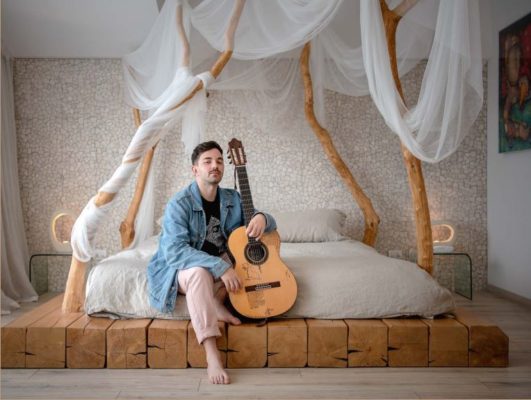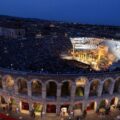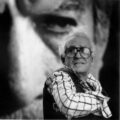March is a special month for the AbanoRitz, chosen not by chance by Terry and Ida Poletto to be dedicated to a dream, a project, a reality: the realization of the Super 8, that we invite you to discover, week by week. Eight authors stayed in our hotel, but more precisely in our rooms at the fifth floor: our Creative Rooms. Eight rooms, eight writers, eight telling.
This week we read Alessio Arena, writer, singer-songwriter and translator class 84 born in Naples. He won the XXIV edition of Musicultura and the A.F.I. award for the best recording project, thus arriving, nowadays, to be author and performer of four albums published between Italy and Spain, where he lives. In 2009 he won the Giuseppe Giusti Opera Prima Award with L’infanzia delle cose (ed. Manni) and going on with Il mio cuore è un mandarino acerbo (ed. Zona, 2010), La letteratura Tamil a Napoli (ed. Neri Pozza, 2014) and La notte non vuole venire (ed. Fandango, 2018). After knowing him, we are convinced that he did not arrive by chance to room 508 “The wood”. which presents us with
“My grandfather the tree”
The most wicked man in the world came to me in a dream when I dozed off on the train which was taking me to Monselice. I was ten years old and, together with my sister, I had left for the summer camp which was offered to the children of the members of the National Association of Italian Partisans. Grandpa Peppino had just passed away at Loreto hospital. Knowing about my imminent departure for the holidays, he had entrusted me with a mission, which was to revive the tree that the most wicked man in the world had uprooted from our loggia in via Moiariello, in Naples, on the farm which my foster family had in the Euganean Hills. “Remember, we’re talking about a cornelian cherry tree” he said, while rummaging through a pillowslip. “It’s not just any tree. It’s the one which Ulysses and his peers used to build the Trojan horse”. Then, he finally handed over a red felt rag to me and opened it to show me some seeds which looked like roast almonds. I didn’t understand why he had waited for that moment to charge me with such a burdensome task, also because the story of the most wicked man in the world, as he used to call the military commander in Naples, during the years of the war and the occupation of the town, he had already told me a thousand times. The story was about lieutenant colonel Walter Schöll, a beanpole in a thousand-medal uniform, who promised the killing of a hundred Neapolitans for each one his killed. Since only very few had replied to the decree for compulsory work service, Schöll himself organised military patrols and thorough searches of the houses of half the town to punish the defaulters. Grandpa Peppino went and hid in the basement of the astronomical observatory near our home, where the caretaker, who was a partisan himself, was sheltering the young subversives of the area. Grandpa Peppino’s mother was the only person at home when the enemy soldiers came to the house. Apparently, she was so frightened of those men that she ran away into the loggia and clung to the only tree of the family, a cornelian cherry tree with a trunk that was slightly thicker than normal and short yellowed branches. Hanging from those branches were the smallest flowers in the world, which were as hard as fishbones. Disappointed with finding another household without men, the soldiers led by Schöll decided to punish grandpa Peppino’s mother. While immediately seeing to separating her from the tree, they bestowed on the plant a treatment which not even the worse enemy of the State would have received. The cornelian cherry tree was first cut down, then sadistically cut into pieces and finally uprooted as if it were weed. During the first years of post-war, grandpa used to say that his mother would not sleep at night because she was awakened by the voice of the old tree, and that voice was a cry. That’s why, in the dream that I had when I finally dozed off on the train a few hours before arriving at the station of Monselice, wicked Schöll was coming after me to steal the seeds which I had been entrusted with. I saw him running up the Moiariello stairs, while holding up the red felt rag, which, from afar, looked like a baby in swaddling clothes. A baby who was crying like babies cry when they realise that they will never return home again. My sister Margherita woke me up worried. As I was sweating, she asked permission to open the window of the carriage. After drying my forehead with her handkerchief, which smelled of camphor, she directed me to look at the countryside that was lighting up out of the window as the train was gradually reducing speed. Everything around us was white, as if we were moving within a bank of clouds. However, here and there, breaking out of the white, were small hamlets, villas surrounded by groves of beech trees and a few churches where I imagined that only birds of prey would go to pray. “So, it is true that there’s no sea.” my sister stated, while ruffling my hair. “But those hills are beautiful, like the stacks off Capri.” When we arrived at the station, Margherita and I saw our names drawn on a sign, behind which was hiding a child of my age. When we approached him, he smiled and told us that his parents were waiting in the car, just outside the station. On that first day in Fontanafredda, the small hamlet where our host family had built a house in the middle of the vineyards, I realised that Giulio’s parents had made themselves available for the summer camp programme just to please him, the child who would not leave me alone for a single minute. He had jug ears and very long red hair, which he pulled into a small pony tail hidden underneath the neck of his t-shirt. His parents told us that Giulio had a very serious malady just after he was born, on Sant’Agnese day, and, to save him, they made a vow to the saint. While Giulio and I were scouting around for hedgehogs, which we systematically left on Margherita’s small bed to frighten her, but also to try to entertain her, Giulio told me stories of saints that his parents had taught him. Especially that of his patron saint, who, for refusing to marry a Roman patrician, was forced to walk naked around the streets of Rome. “But she started praying” he confided to me, “and miraculously her hair became very long, until it covered all her body”. Giulio’s parents left us free to wander around the fields surrounding the house, where I was studying the soil, secretly imagining the best place where to sow grandpa Peppino’s seeds. Then one day, Margherita woke up with a sore back and complained she had ended up in a place where she did nothing but write letters to her lucky classmates on holiday on the crowded beaches of Ischia. So, the parents decided they would take us to a spa hotel nearby. “Let’s go to Abano” Giulio’s mother said, while cracking her neck rather violently. “They have some mud baths there which are a real marvel”. We left for a week. Giulio had assured me that at the AbanoRitz, the hotel which had already hosted them a handful of times, there was plenty of space to play hide and seek, and we would have a big swimming pool available to us, a whole room for us and a garden full of trees where wild rabbits had their burrows. It was perhaps that last fact which persuaded me to take grandpa Peppino’s rag with me, and that, at least what I thought then, was my only big mistake. I discovered that the owners, but especially their daughter who was our age, lived on the fifth floor. Giulio had never met her but he had been told that she really loved nature and that a tree house was about to be built for her in the garden. Right at that moment, I realised that I did not have the seeds anymore. I rushed back to our room and looked in each and every pocket, in the slippers, in the wardrobes, under the beds but, nothing. The red felt rag had disappeared. While crying, I told Giulio’s mother and she reassured me saying that it was impossible to lose something in that hotel. Yet, nobody was able to give an answer. So, I took it into my head that the girl who lived in the hotel was the only one who could help. Nevertheless, fate was planning against us. We discovered that Ilaria – that was her name – had caught chicken pox, so obviously it was impossible to go to visit her on the fifth floor. Our holiday ended two days after that blow to the heart, which I was unable to explain to Giulio’s parents. The rest of my stay in Fontanafredda was just a series of bad dreams, in which Schöll was handing the handset of a red telephone over to me and I heard grandpa Peppino’s tree crying. Fortunately, it soon came time to go back to Naples, and, as time passed, I tried to forget about that unfortunate episode. Over the years, though, I maintained a sort of regular correspondence with Giulio. He would tell me about his successful results at school, then at university, about girls and also about him continuously returning to the AbanoRitz, where he never gave up looking for my red felt rag, even though he never asked me what the rag contained. I used to write to him as well, while imagining that, one day or another, I would see my unforeseen dear friend again. Then Giulio told me something unbelievable. He was getting married, and he was getting married to Ilaria, the mysterious girl who lived in the hotel. He told me that she was beautiful, although she had the same ears as his, badly concealed by a funny bob of blonde hair. I didn’t manage to go over for their wedding because, at that time, I had moved house to live on my own and started working at the faculty of agriculture as an assistant professor. I was not earning much, though, so I could not travel. Shortly after the wedding, Giulio, who had become an architect by then, told me that, while their house in the ghetto of Padova was being renovated, he had gone to live at the AbanoRitz with Ilaria. He sent me a photo of them sitting, with a wicker basket full of small red fruit on their laps. “Those are cornel berries” he wrote. “The sophisticated sisters of cherries. Every spring, they sprout bountifully from a small tree in the hotel garden”. I held my breath. Even from afar I could smell the scent of my Grandfather The Tree, or perhaps, right at that instant, my own heart became a tiny red fruit itself.

© Giovanni De Sandre











